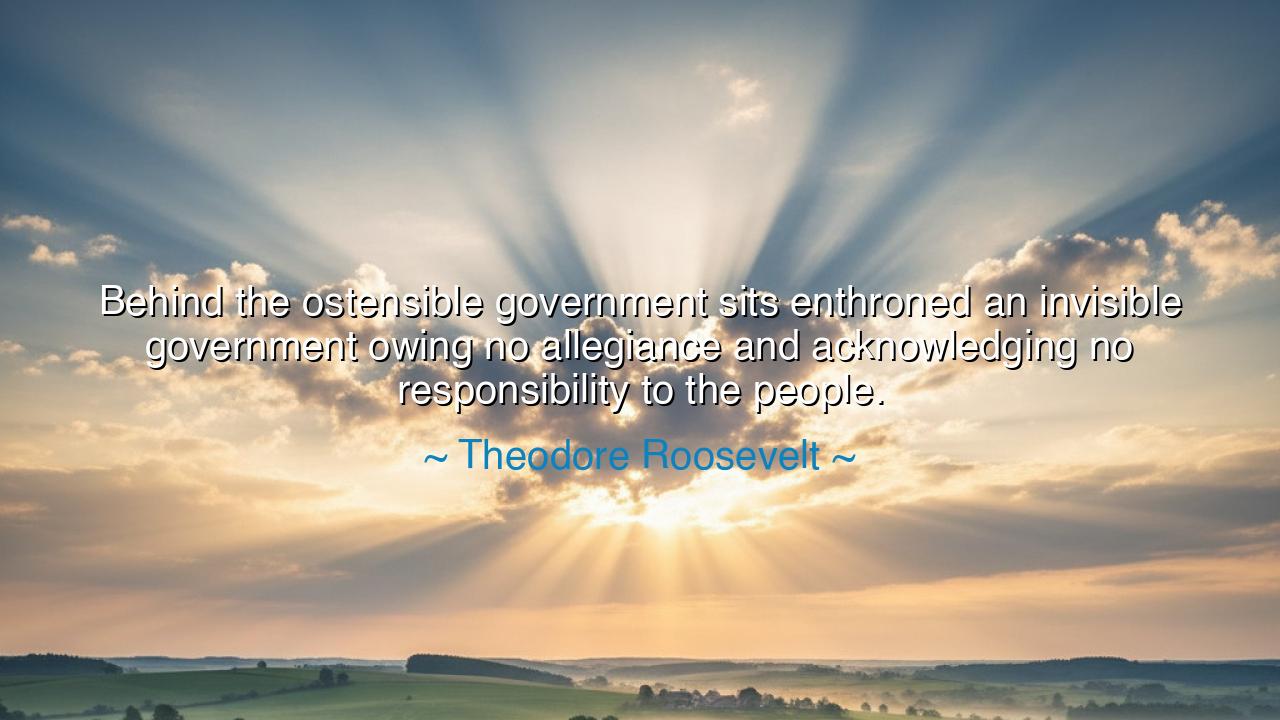
Behind the ostensible government sits enthroned an invisible
Behind the ostensible government sits enthroned an invisible government owing no allegiance and acknowledging no responsibility to the people.






"Behind the ostensible government sits enthroned an invisible government owing no allegiance and acknowledging no responsibility to the people." – Theodore Roosevelt
In these thunderous words, Theodore Roosevelt, the warrior-president and champion of reform, lifts the veil upon a truth that echoes through every age: that power often hides itself behind the illusion of democracy. He speaks not merely of corruption, but of the deeper danger—the quiet rise of unseen rulers, the networks of influence that command without consent and govern without accountability. His language is not of suspicion but of revelation, as if to say: beware the shadow that moves behind the throne, for it is there that the real sovereign may dwell.
The origin of this quote lies in Roosevelt’s crusade against the great trusts and monopolies that gripped America at the dawn of the 20th century. As the nation industrialized, a handful of corporations amassed wealth beyond imagination, their influence stretching from factories to the halls of Congress. Though the people voted and presidents changed, the true reins of power remained in the hands of financiers and industrial barons. Roosevelt, a man of action and moral fire, saw this with clarity and fury. His warning was not only about his own era but about the eternal conflict between the public will and private dominion.
Roosevelt believed that democracy must be more than ceremony—it must be a living covenant between the people and their government, transparent and sacred. Yet he saw that even in the Republic he loved, forces of greed had erected an empire of invisibility—lobbyists, financiers, and power brokers who bent the state to their will. They owed allegiance to no flag, bore no duty to justice, and served only their own interests. This, he declared, was an invisible government enthroned, a silent tyranny cloaked in the garments of legitimacy. His words were not the rhetoric of conspiracy, but the cry of a patriot defending the soul of democracy from its own corruption.
History has vindicated his warning many times. Consider the Gilded Age that preceded him, when railroad magnates and oil kings dictated the course of the nation. Men like John D. Rockefeller and J.P. Morgan could, with a whisper, sway markets, laws, and elections. Their power did not bear the name of tyranny, yet it ruled as surely as any monarch. Roosevelt’s courage to confront them through antitrust laws and the Square Deal restored some measure of justice to the American people. Yet his insight reaches far beyond his century—it speaks to all who live in systems where wealth and influence blur the boundary between governance and control.
The heart of his warning lies in this truth: that when power becomes unseen, accountability vanishes, and with it, freedom. The visible government—the parliaments, presidents, and prime ministers—may speak for the people, but if their strings are pulled by hidden interests, then democracy becomes theater, not truth. This invisible government may take many forms: corporate monopolies, intelligence networks, media manipulation, or shadowy financial systems. The names change, but the danger remains the same—the divorce of power from responsibility, of control from conscience.
But Roosevelt’s words are not a dirge—they are a call to vigilance. He believed that the antidote to invisible power is an awakened citizenry. No government can remain free unless its people are watchful, informed, and brave enough to demand transparency. His voice, echoing through time, reminds us that liberty is not preserved by comfort but by struggle. Democracy is a living flame, and every generation must tend it, lest it be extinguished by those who thrive in darkness.
The lesson, then, is clear: the strength of a nation lies not in the might of its institutions but in the moral courage of its citizens. To expose what hides behind the façade of power is not rebellion—it is patriotism. The invisible government thrives on apathy, but it perishes under the light of truth. The people must be the guardians of that light, questioning authority, demanding honesty, and refusing to surrender their sovereignty to unseen hands.
And so, the practical actions are these: seek knowledge, for ignorance is the ally of tyranny; speak truth, even when it challenges power; and stand watch over the guardians who claim to serve you. Support leaders of integrity, not those of convenience. Remember always that the duty of freedom is vigilance, and the price of democracy is attention. For as Roosevelt warned, the moment the people cease to look behind the curtain, the invisible government enthrones itself, and the Republic becomes but a shadow of what it once promised to be.






AAdministratorAdministrator
Welcome, honored guests. Please leave a comment, we will respond soon